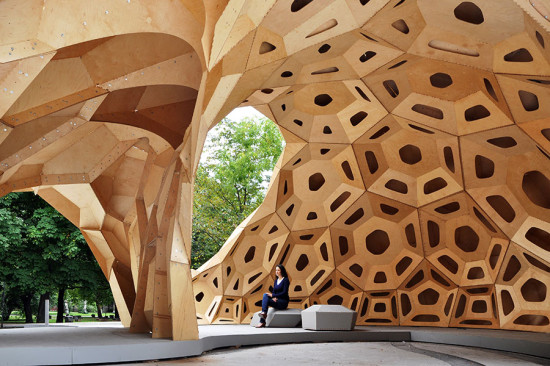
A cross-section of postdigital design work illustrates the role of parametrics in the built environment.
Spawned from his 2011 show on Patrick Jouin, Museum of Arts & Design (MAD) curator Ronald Labaco conceived Out of Hand as a more comprehensive show that clarified the role of digital design, from its capabilities to its significance in our daily lives. “People just didn’t get it,” said Labaco of Jouin’s 2011 MAD show. “Unless you’re immersed in it, it can be hard to understand so I thought if we showed something like this in the galleries again, we needed to provide information that can be digested more clearly.”
Staged across three floors of the museum, with two exterior sculptures, Labaco said the show is an important program for MAD among other New York art institutions like MoMA, Cooper Hewitt, and the New Museum. The goal to raise awareness of 3D printing is timely, by chance. “Paolo Antonelli’s Design and the Elastic Mind, and two shows from Material Connection were complements to my show for the uninitiated,” Labaco explained. Out of Hand’s broad scope includes digital designing and fabrication processes like CNC milling, digital weaving and knitting, laser cutting, and 3D printing to display how these technologies influence the built environment. “It’s a historical look at the last 8 years and works from as early as 2005 are incorporated because, in my mind, that was when the major shift between rapid prototyping and 3D printing really occurred,” said Labaco.
- Curator Ronald Labaco
- Location Museum of Arts & Design, New York
- Date October 2013– July 2014
- Materials ceramic, concrete, polyurethane, resin, PVC, metal, gypsum, wax, paper, wood, jacquard
- Process water jet cutting, laser cutting, laser sintering, 3D printing, digital weaving
Organized in six themes, a cross-section of traditional methods and new design capabilities are illustrated by architects crafting art, artists doing design, and photographers making sculpture. Approximately half a dozen pieces were commissioned for the show while others were an extension of existing works: For example, a chair by Jan Habraken evolved into the more comprehensive Charigenics. Placards for each piece call out production methods, from 3D printing (10 materials are featured) to digital knitting, underscoring the multi-step creation process to make the point that digital design isn’t only press-and-print.
And many of the show’s pieces are a combination of old-world handcrafting and newer digital geometries and computations. Pieces like Rapid Racer, Bosch’s 3D-printed vehicle fabricated over 10 days and weighing just 29 pounds, and Zaha Hadid’s Liquid Glacial “Smoke”, a coffee table CNC-milled from polished plexiglass, illustrate the functional role of digital design. Data input is actively incorporated through two interactive pieces from Francios Brument, for which he developed his own scripting, as well as a Shapeways workshop that is open to the public. Traditional forms are realized by new methods in Nendo’s 3D-printed paper boxes that are lacquered with traditional urushi for a ringed faux bois.
Other featured artists, architects, and designers include Richard DuPont, Greg Lynn, Anish Kapoor, Marc Newson, Frank Stella, Daniel Libeskind, and Maya Lin. Just as dynamic as the digital disciplines themselves, new pieces are being added throughout the show’s run. Look for a new piece from Iris Van Herpen by mid-November.
Out of Hand will remain on view through July 6, 2014.
